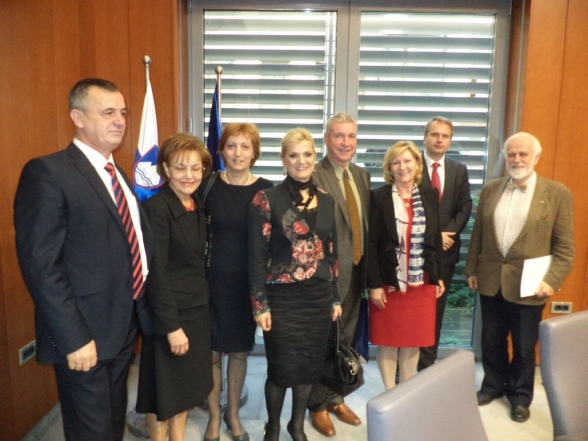Within the official meetings, the Committee Delegation held a meeting in the Ministry of Education, Science and Sports with the Delegation of the Ministry, headed by Mr Mirko Stopar, MA, Head of Directorate for Higher Education. In the National Assembly of the Republic of Slovenia, the Committee Delegation met with Mr Jožef Kavtičnik, the Chairperson of the Committee on Education, Science, Sports and Youth; Ms Majda Potrata, Chairperson of the Committee on Culture; and members of the two Committees.
During the meeting in the National Assembly and the Ministry of Education, Science and Sports, it was pointed out with pleasure that the cooperation with the two countries in the field of education had been going on for a while.
With regard to the Slovenian education system, the Bologna education system reform in Slovenia had started in 2004, when it had been prescribed by the Law that all old programmes must be transferred into the Bologna system by 2010. Considering that there was still a number of students who did not complete their studies which they had started under the old system, the deadline for completing their studies had been extended until the end of 2015/2016. Additionally, in 2004, the grounds for funding the new school system had been established, which had been amended several times until now.
Slovenia features a relatively small number of universities – four (three state universities and one private), and an increased number of the so-called independent educational institutions – 39 in total. Slovenia is also characterised by a declining number of students each year, while a number of students enrolling senior professional schools is on the rise. Furthermore, a number of students enrolling social sciences study programmes is in decline (from 45% to 36%), while enrolment in technical faculties is on the rise.
The Government of Slovenia has also adopted a National Programme for Higher Education 2011-2020, aimed at modernising higher education until 2020. Special accent is placed on internationalisation of higher education, with a view to attract at least 10% of foreign students and lecturers by 2020, but also to increase the number of mobile study programmes in foreign languages, as well as to increase the number of transnational research projects and joint study programmes.
Apart from internationalisation, the quality of higher education is also highlighted. With regard to the quality of lectures, the legal amendments from 2004 created the grounds for founding the Slovenian Quality Assurance Agency for Higher Education. One of the newly set goals is to have the Agency sign in the European Association for Quality Assurance in Higher Education, and to fully incorporate European standards and guidelines into the internal institutional systems of quality assurance.
With regard to one of the EU goals in this field, which is to have 40% of young people ages from 30-34 with completed higher education, Slovenia has already reached that goal. On the other hand, Slovenia ranks fourth in the EU with regard to the quota of generations that enrol in higher education schools, which is considered to be too high.
With regard to the education funding, Slovenia’s goal is to increase investments in this field. Specifically, for tertiary education, the goal is to increase investments from at least 1.6% of GDP until 2015 to 2.5% of GDP until 2020. At the moment, the Government of Slovenia allocates 1.3% of GDP per year for higher education, or € 295 million.
With regard to the primary education, the Government of Slovenia funds textbooks for all students of primary schools, while the parents pay for exercise books, and, possibly for damaged textbooks. Additionally, Slovenia provides free transportation for all students, funded by the local administration and the Government.
During the conversation in Slovenia, members of the Delegation have shown special interest in the experiences of Slovenia with regard to implementation of the Bologna Declaration, harmonisation of the education system with the labour market, budget allocations, licencing of teachers, election of principals of the educational institutions, etc.
The Study Visit to Slovenia was deemed to be very successful and of significant importance for the future work of the Committee on Education, Science, Culture and Sports.









